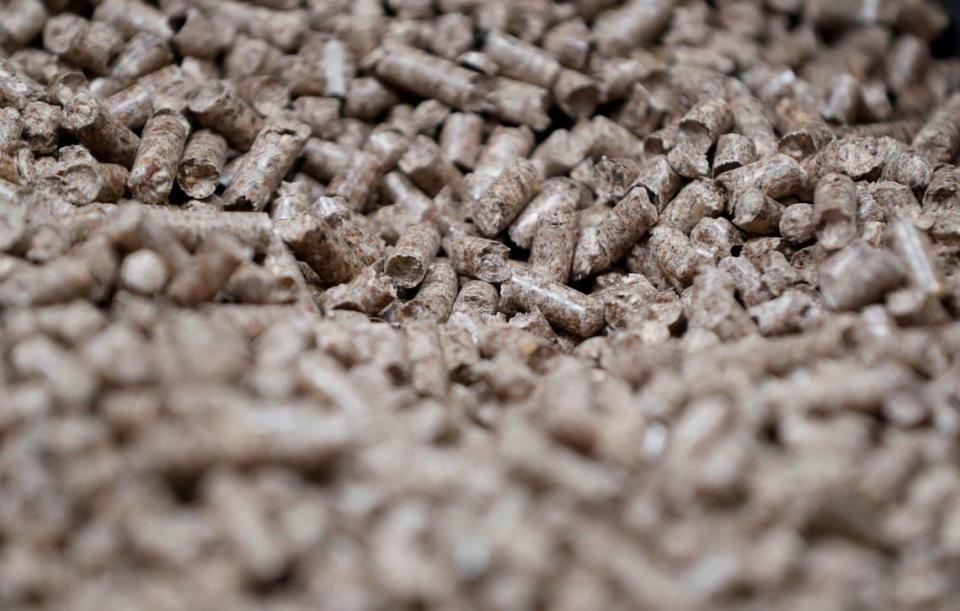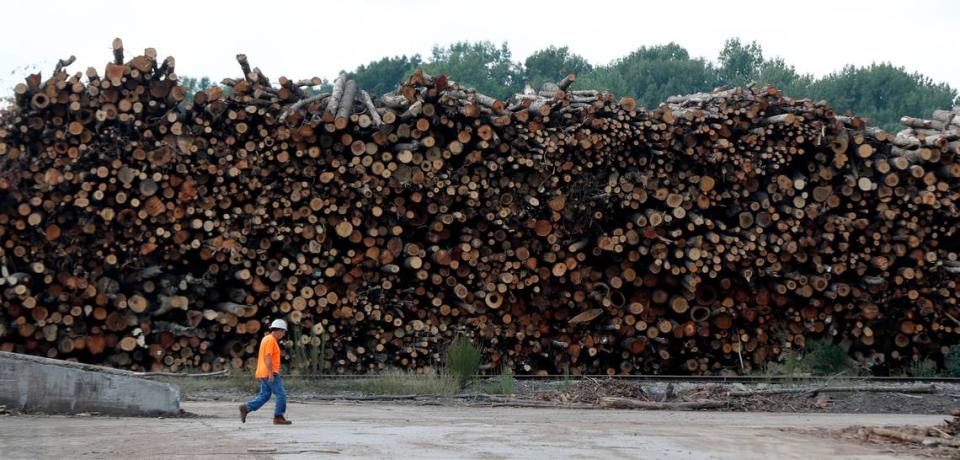Enviva made NC the largest source of wood pellets. Now the company is in trouble.
Enviva, the world’s largest wood pellet maker with four plants and a marine terminal in Eastern North Carolina, is in financial trouble.
After reporting big losses in the fall, the Maryland-based company missed a $24.4 million bond payment this month, helping drive its stock price to new lows. After peaking at nearly $88 a share in April 2022, the company’s stock closed at 36 cents Wednesday.
The company reported a net loss of $85.2 million in the third quarter of last year, despite selling 14% more pellets than during the same quarter a year earlier. Enviva transforms trees and scrap wood from the Southeastern United States into cylindrical pellets about as big around as a pencil that it ships to Europe and Asia to be burned for heat and electricity.
Company officials cite several factors for the losses, including higher interest costs and charges related to shutting down equipment at a plant in Southampton, Virginia.
But what has pushed the company to the brink of insolvency, they say, is some poor bets on the price of wood pellets that it made in late 2022. The company agreed to purchase 1.8 million metric tons of pellets at prices above what it had been getting up to that point, on the assumption that prices would rise and it could sell the pellets at a profit on the spot market.
That didn’t happen, Glenn Nunziata, interim chief executive officer, said during third quarter earnings call in November.
“Spot market prices for wood pellets this year have not evolved in the way we anticipated,” Nunziata said. “And that weakness in the spot market caused us to significantly miss our expectations for the third quarter as well as materially reduce our expectations for the fourth quarter of this year.”
The company’s third-quarter report said it was taking several steps to try to right itself and pay its creditors, including attempting to renegotiate contracts with customers and hiring outside lawyers, financial advisers and management consultants.
But, the report said, the events of the previous year “raise substantial doubts regarding the company’s ability to continue as a going concern.”

Enviva’s business model depends on policies in Europe and Asia that view burning wood pellets as less harmful to the environment than fossil fuels. The European Commission directed its member countries to derive 20% of their energy from renewable sources and said the burning of biomass such as wood pellets was one way to meet that goal.
But critics say cutting trees in the U.S. to create pellets that have to be shipped overseas isn’t a sound strategy for combating climate change. Scientists and ecologists point out that burning wood pellets releases more carbon dioxide than burning coal and that it may take decades for replanted trees to reabsorb it.
North Carolina the leading source of wood pellets
Still, demand for wood pellets has been strong, and Enviva grew quickly to meet it. The company bought two small existing pellet mills in Mississippi in 2010 and built its first in Ahoskie, in northeastern North Carolina, the following year. It now owns and operates 10 plants throughout the Southeast, including three others in North Carolina in Northampton, Richmond and Sampson counties.
Enviva’s North Carolina plants are capable of producing more than 2 million tons of wood pellets a year, making the state the country’s largest source, according to the U.S. Energy Information Administration.
The company’s pellets are loaded onto ships at six deep-water ports in the Southeast, including the Port of Wilmington.
In its filing with the Securities and Exchange Commission, Enviva said it had sufficient cash on hand to make the $24.4 million interest payment due Jan. 16. It says it chose to take advantage of a grace period to “enhance its short-term financial flexibility” as it seeks to overhaul its finances. It has 30 days from the due date to make the payment and avoid being in default.
The company did not respond to an email and phone message asking if it planned to make the payment or had made progress renegotiating its contracts.
In the call with investors in November, Nunziata referred to the company’s financial problems as “short-term headwinds” that it was urgently working to overcome. But he insisted the long-term outlook was good.
“As we look beyond the next few quarters,” he said, “we remain optimistic regarding the long-term value inherent in this business and in this industry.”


